University Essay: Methodological Issues in Psychotherapy and Outcomes
VerifiedAdded on 2020/04/21
|14
|3611
|104
Essay
AI Summary
This essay delves into the methodological challenges encountered in psychotherapy, focusing on two key issues: responsiveness and the application of Interpersonal Psychotherapy (IPT). It explores the ethical dilemmas therapists face, particularly in maintaining therapeutic boundaries and addressing client responsiveness. The essay examines outcome research, including a study on client feedback in couple therapy, highlighting the benefits of responsiveness in improving therapeutic outcomes. Furthermore, it investigates the use of IPT in treating anxiety disorders, reviewing relevant studies and discussing the methodological considerations. The essay analyzes the strengths and limitations of different approaches, providing a comprehensive overview of the complexities and advancements in psychotherapy practices.
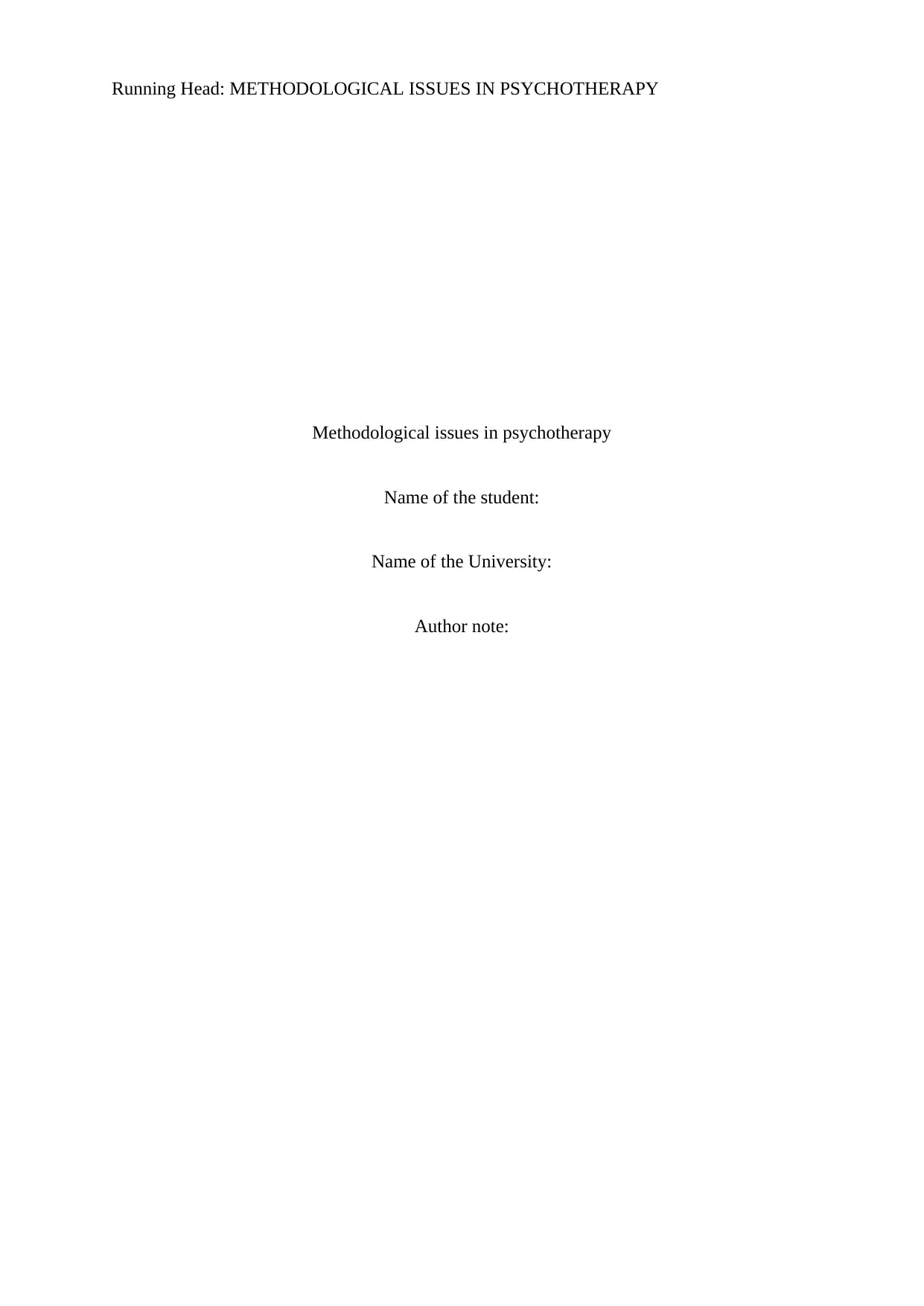
Running Head: METHODOLOGICAL ISSUES IN PSYCHOTHERAPY
Methodological issues in psychotherapy
Name of the student:
Name of the University:
Author note:
Methodological issues in psychotherapy
Name of the student:
Name of the University:
Author note:
Paraphrase This Document
Need a fresh take? Get an instant paraphrase of this document with our AI Paraphraser
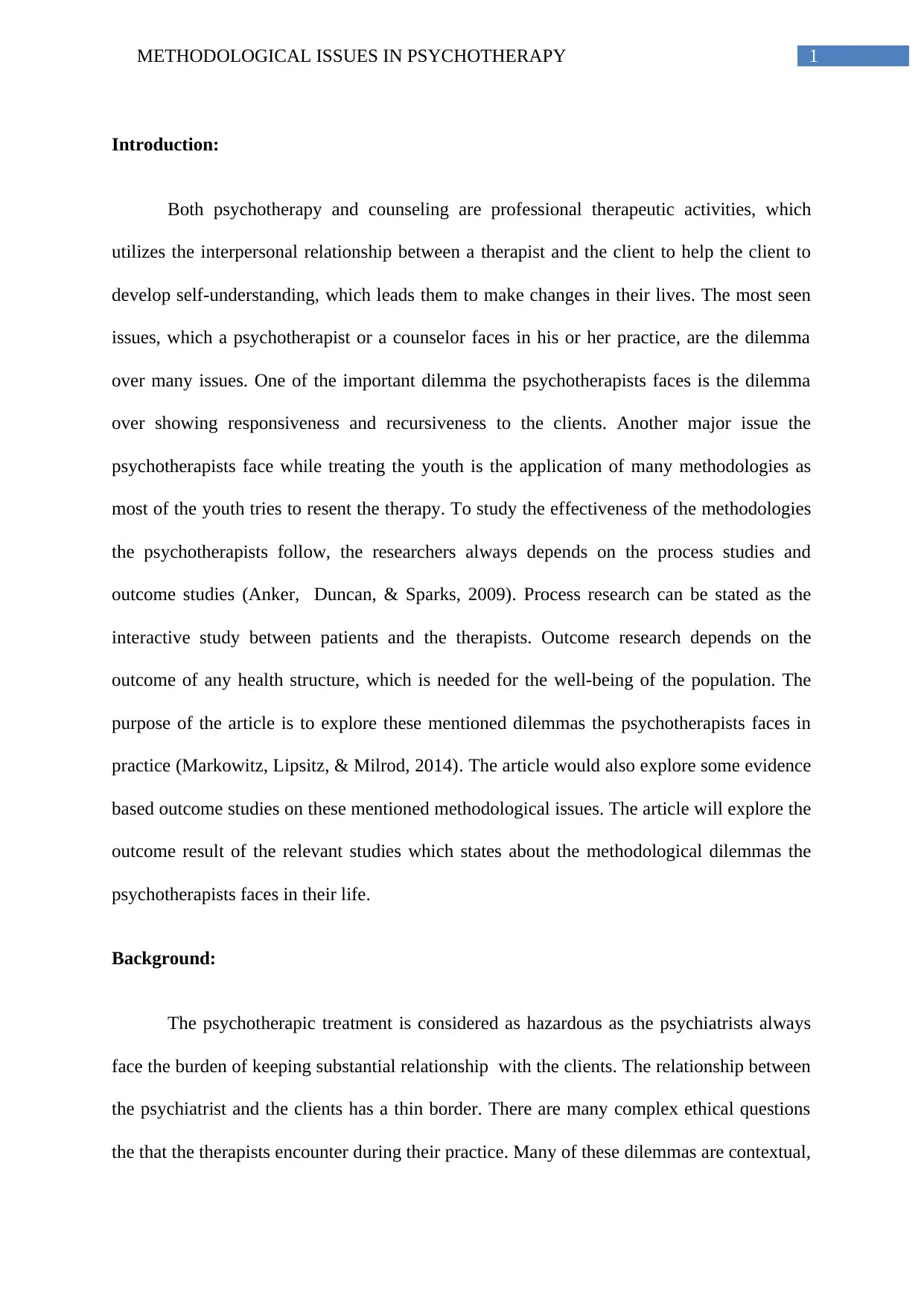
1METHODOLOGICAL ISSUES IN PSYCHOTHERAPY
Introduction:
Both psychotherapy and counseling are professional therapeutic activities, which
utilizes the interpersonal relationship between a therapist and the client to help the client to
develop self-understanding, which leads them to make changes in their lives. The most seen
issues, which a psychotherapist or a counselor faces in his or her practice, are the dilemma
over many issues. One of the important dilemma the psychotherapists faces is the dilemma
over showing responsiveness and recursiveness to the clients. Another major issue the
psychotherapists face while treating the youth is the application of many methodologies as
most of the youth tries to resent the therapy. To study the effectiveness of the methodologies
the psychotherapists follow, the researchers always depends on the process studies and
outcome studies (Anker, Duncan, & Sparks, 2009). Process research can be stated as the
interactive study between patients and the therapists. Outcome research depends on the
outcome of any health structure, which is needed for the well-being of the population. The
purpose of the article is to explore these mentioned dilemmas the psychotherapists faces in
practice (Markowitz, Lipsitz, & Milrod, 2014). The article would also explore some evidence
based outcome studies on these mentioned methodological issues. The article will explore the
outcome result of the relevant studies which states about the methodological dilemmas the
psychotherapists faces in their life.
Background:
The psychotherapic treatment is considered as hazardous as the psychiatrists always
face the burden of keeping substantial relationship with the clients. The relationship between
the psychiatrist and the clients has a thin border. There are many complex ethical questions
the that the therapists encounter during their practice. Many of these dilemmas are contextual,
Introduction:
Both psychotherapy and counseling are professional therapeutic activities, which
utilizes the interpersonal relationship between a therapist and the client to help the client to
develop self-understanding, which leads them to make changes in their lives. The most seen
issues, which a psychotherapist or a counselor faces in his or her practice, are the dilemma
over many issues. One of the important dilemma the psychotherapists faces is the dilemma
over showing responsiveness and recursiveness to the clients. Another major issue the
psychotherapists face while treating the youth is the application of many methodologies as
most of the youth tries to resent the therapy. To study the effectiveness of the methodologies
the psychotherapists follow, the researchers always depends on the process studies and
outcome studies (Anker, Duncan, & Sparks, 2009). Process research can be stated as the
interactive study between patients and the therapists. Outcome research depends on the
outcome of any health structure, which is needed for the well-being of the population. The
purpose of the article is to explore these mentioned dilemmas the psychotherapists faces in
practice (Markowitz, Lipsitz, & Milrod, 2014). The article would also explore some evidence
based outcome studies on these mentioned methodological issues. The article will explore the
outcome result of the relevant studies which states about the methodological dilemmas the
psychotherapists faces in their life.
Background:
The psychotherapic treatment is considered as hazardous as the psychiatrists always
face the burden of keeping substantial relationship with the clients. The relationship between
the psychiatrist and the clients has a thin border. There are many complex ethical questions
the that the therapists encounter during their practice. Many of these dilemmas are contextual,
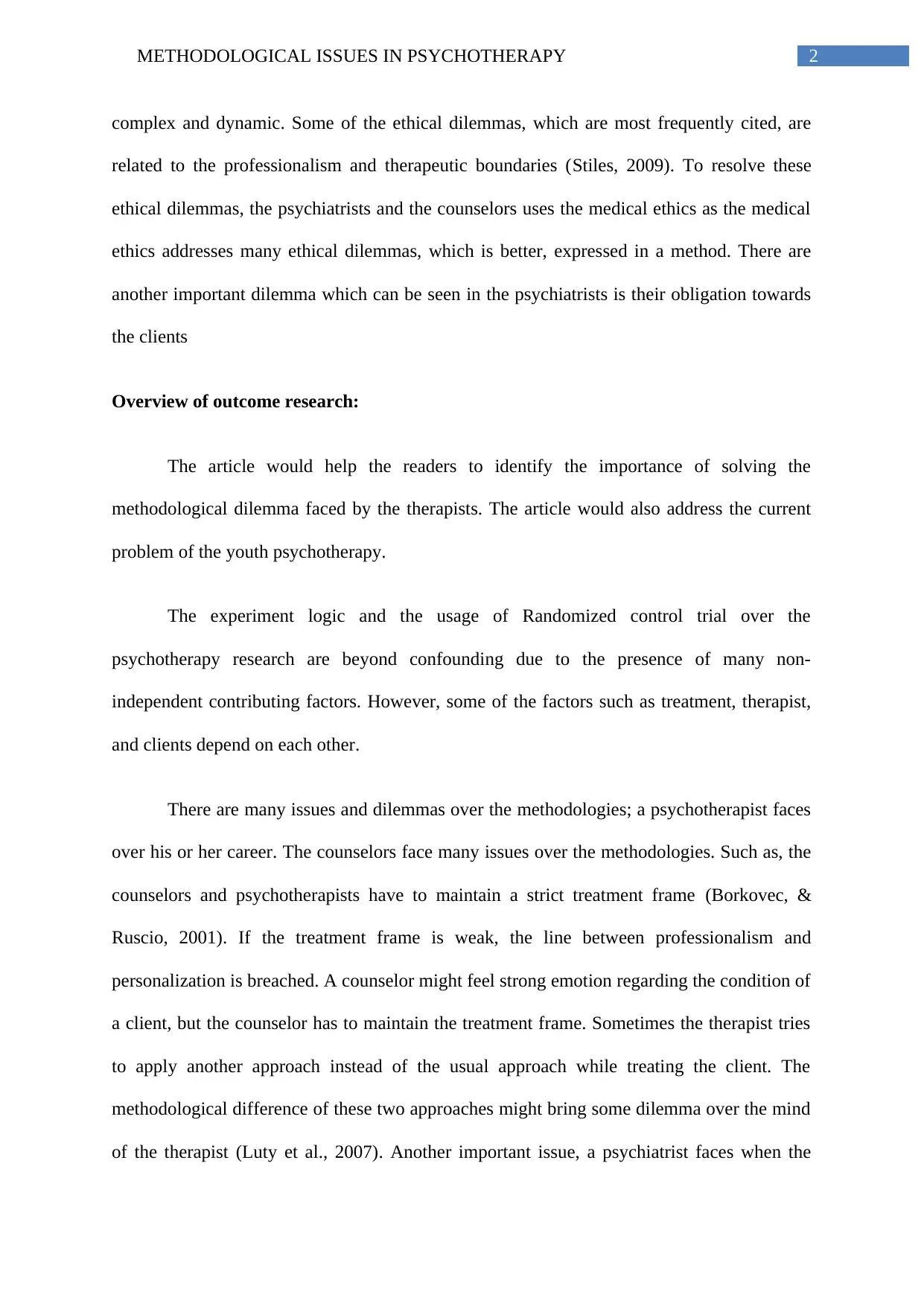
2METHODOLOGICAL ISSUES IN PSYCHOTHERAPY
complex and dynamic. Some of the ethical dilemmas, which are most frequently cited, are
related to the professionalism and therapeutic boundaries (Stiles, 2009). To resolve these
ethical dilemmas, the psychiatrists and the counselors uses the medical ethics as the medical
ethics addresses many ethical dilemmas, which is better, expressed in a method. There are
another important dilemma which can be seen in the psychiatrists is their obligation towards
the clients
Overview of outcome research:
The article would help the readers to identify the importance of solving the
methodological dilemma faced by the therapists. The article would also address the current
problem of the youth psychotherapy.
The experiment logic and the usage of Randomized control trial over the
psychotherapy research are beyond confounding due to the presence of many non-
independent contributing factors. However, some of the factors such as treatment, therapist,
and clients depend on each other.
There are many issues and dilemmas over the methodologies; a psychotherapist faces
over his or her career. The counselors face many issues over the methodologies. Such as, the
counselors and psychotherapists have to maintain a strict treatment frame (Borkovec, &
Ruscio, 2001). If the treatment frame is weak, the line between professionalism and
personalization is breached. A counselor might feel strong emotion regarding the condition of
a client, but the counselor has to maintain the treatment frame. Sometimes the therapist tries
to apply another approach instead of the usual approach while treating the client. The
methodological difference of these two approaches might bring some dilemma over the mind
of the therapist (Luty et al., 2007). Another important issue, a psychiatrist faces when the
complex and dynamic. Some of the ethical dilemmas, which are most frequently cited, are
related to the professionalism and therapeutic boundaries (Stiles, 2009). To resolve these
ethical dilemmas, the psychiatrists and the counselors uses the medical ethics as the medical
ethics addresses many ethical dilemmas, which is better, expressed in a method. There are
another important dilemma which can be seen in the psychiatrists is their obligation towards
the clients
Overview of outcome research:
The article would help the readers to identify the importance of solving the
methodological dilemma faced by the therapists. The article would also address the current
problem of the youth psychotherapy.
The experiment logic and the usage of Randomized control trial over the
psychotherapy research are beyond confounding due to the presence of many non-
independent contributing factors. However, some of the factors such as treatment, therapist,
and clients depend on each other.
There are many issues and dilemmas over the methodologies; a psychotherapist faces
over his or her career. The counselors face many issues over the methodologies. Such as, the
counselors and psychotherapists have to maintain a strict treatment frame (Borkovec, &
Ruscio, 2001). If the treatment frame is weak, the line between professionalism and
personalization is breached. A counselor might feel strong emotion regarding the condition of
a client, but the counselor has to maintain the treatment frame. Sometimes the therapist tries
to apply another approach instead of the usual approach while treating the client. The
methodological difference of these two approaches might bring some dilemma over the mind
of the therapist (Luty et al., 2007). Another important issue, a psychiatrist faces when the
⊘ This is a preview!⊘
Do you want full access?
Subscribe today to unlock all pages.

Trusted by 1+ million students worldwide
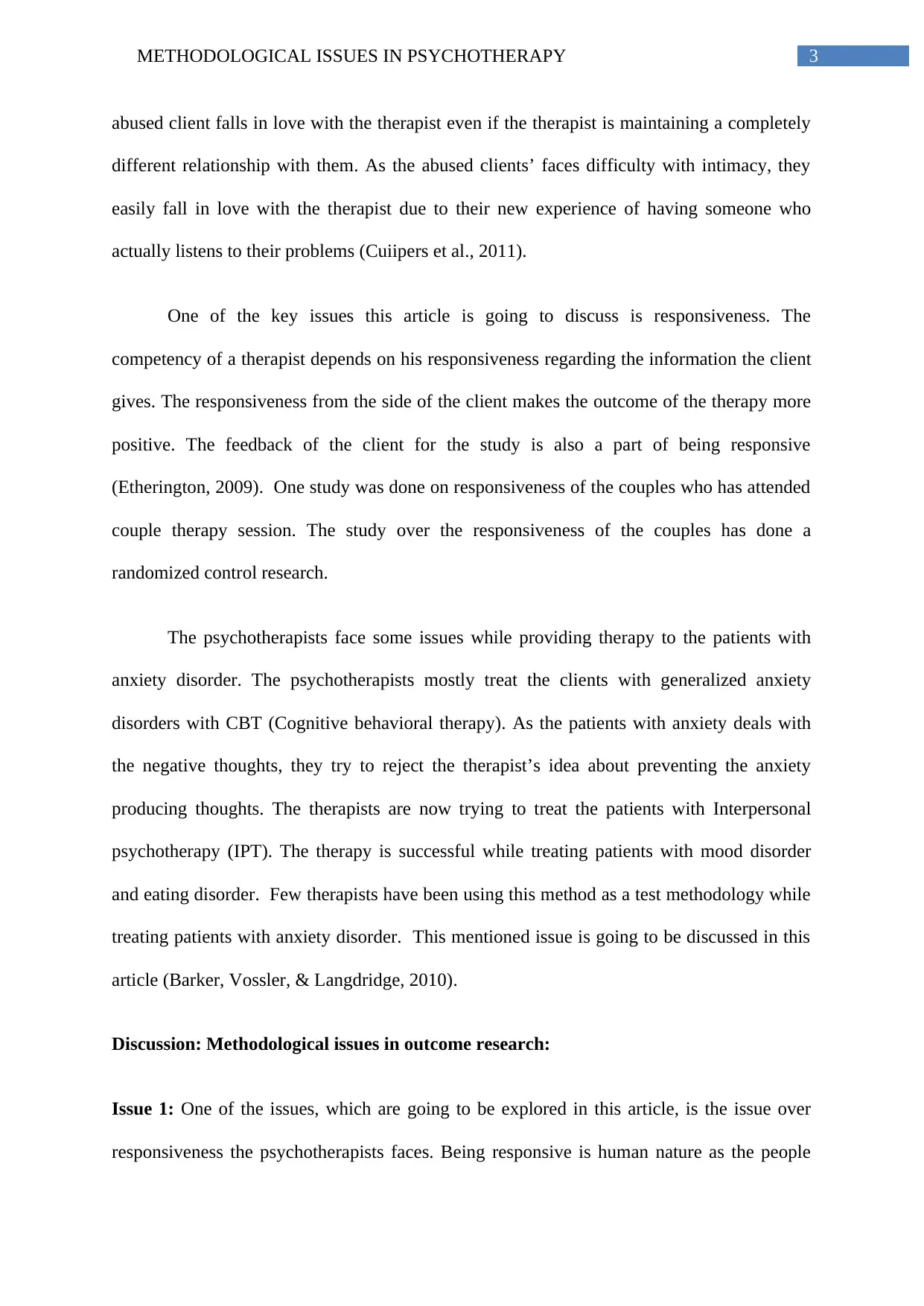
3METHODOLOGICAL ISSUES IN PSYCHOTHERAPY
abused client falls in love with the therapist even if the therapist is maintaining a completely
different relationship with them. As the abused clients’ faces difficulty with intimacy, they
easily fall in love with the therapist due to their new experience of having someone who
actually listens to their problems (Cuiipers et al., 2011).
One of the key issues this article is going to discuss is responsiveness. The
competency of a therapist depends on his responsiveness regarding the information the client
gives. The responsiveness from the side of the client makes the outcome of the therapy more
positive. The feedback of the client for the study is also a part of being responsive
(Etherington, 2009). One study was done on responsiveness of the couples who has attended
couple therapy session. The study over the responsiveness of the couples has done a
randomized control research.
The psychotherapists face some issues while providing therapy to the patients with
anxiety disorder. The psychotherapists mostly treat the clients with generalized anxiety
disorders with CBT (Cognitive behavioral therapy). As the patients with anxiety deals with
the negative thoughts, they try to reject the therapist’s idea about preventing the anxiety
producing thoughts. The therapists are now trying to treat the patients with Interpersonal
psychotherapy (IPT). The therapy is successful while treating patients with mood disorder
and eating disorder. Few therapists have been using this method as a test methodology while
treating patients with anxiety disorder. This mentioned issue is going to be discussed in this
article (Barker, Vossler, & Langdridge, 2010).
Discussion: Methodological issues in outcome research:
Issue 1: One of the issues, which are going to be explored in this article, is the issue over
responsiveness the psychotherapists faces. Being responsive is human nature as the people
abused client falls in love with the therapist even if the therapist is maintaining a completely
different relationship with them. As the abused clients’ faces difficulty with intimacy, they
easily fall in love with the therapist due to their new experience of having someone who
actually listens to their problems (Cuiipers et al., 2011).
One of the key issues this article is going to discuss is responsiveness. The
competency of a therapist depends on his responsiveness regarding the information the client
gives. The responsiveness from the side of the client makes the outcome of the therapy more
positive. The feedback of the client for the study is also a part of being responsive
(Etherington, 2009). One study was done on responsiveness of the couples who has attended
couple therapy session. The study over the responsiveness of the couples has done a
randomized control research.
The psychotherapists face some issues while providing therapy to the patients with
anxiety disorder. The psychotherapists mostly treat the clients with generalized anxiety
disorders with CBT (Cognitive behavioral therapy). As the patients with anxiety deals with
the negative thoughts, they try to reject the therapist’s idea about preventing the anxiety
producing thoughts. The therapists are now trying to treat the patients with Interpersonal
psychotherapy (IPT). The therapy is successful while treating patients with mood disorder
and eating disorder. Few therapists have been using this method as a test methodology while
treating patients with anxiety disorder. This mentioned issue is going to be discussed in this
article (Barker, Vossler, & Langdridge, 2010).
Discussion: Methodological issues in outcome research:
Issue 1: One of the issues, which are going to be explored in this article, is the issue over
responsiveness the psychotherapists faces. Being responsive is human nature as the people
Paraphrase This Document
Need a fresh take? Get an instant paraphrase of this document with our AI Paraphraser
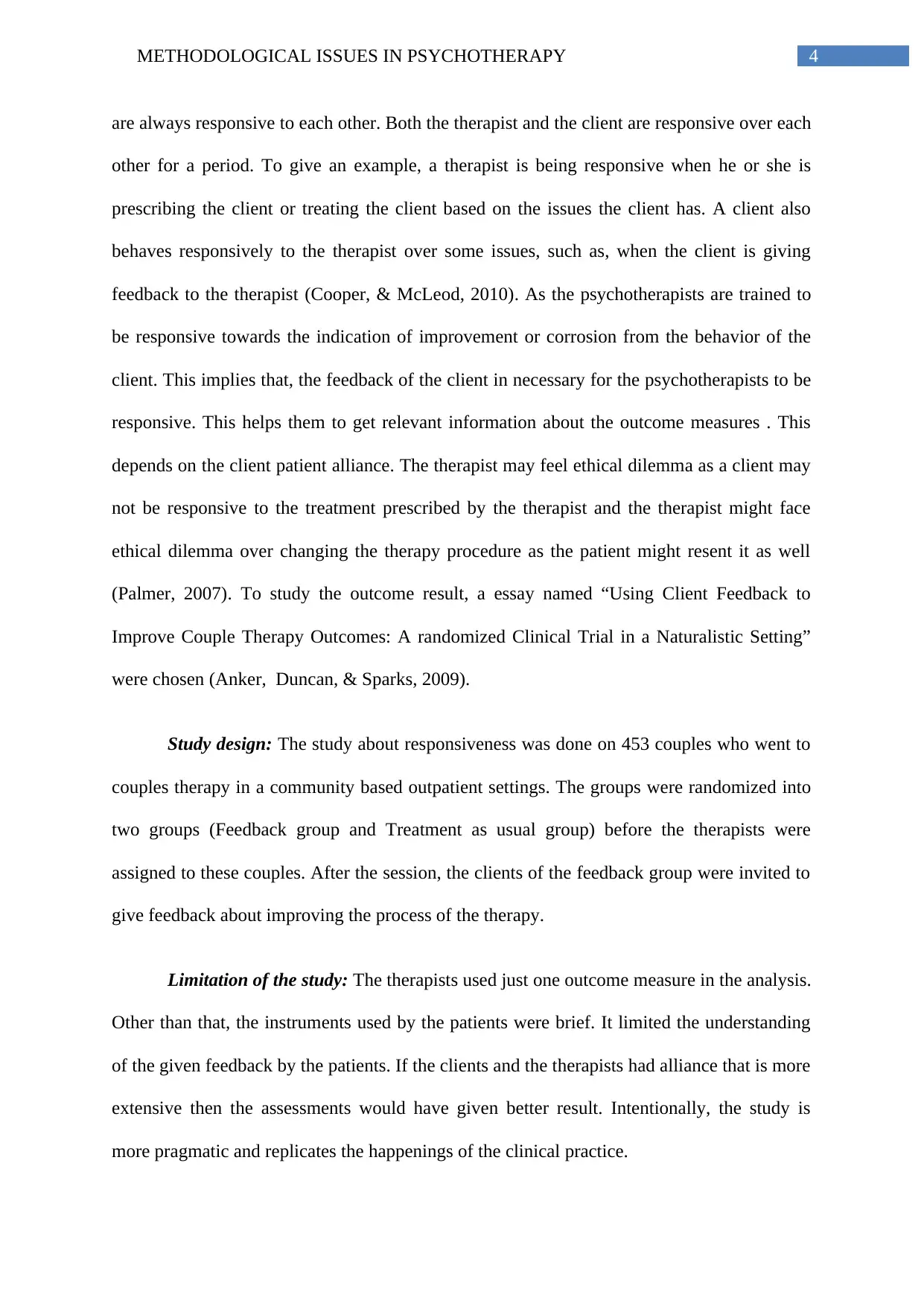
4METHODOLOGICAL ISSUES IN PSYCHOTHERAPY
are always responsive to each other. Both the therapist and the client are responsive over each
other for a period. To give an example, a therapist is being responsive when he or she is
prescribing the client or treating the client based on the issues the client has. A client also
behaves responsively to the therapist over some issues, such as, when the client is giving
feedback to the therapist (Cooper, & McLeod, 2010). As the psychotherapists are trained to
be responsive towards the indication of improvement or corrosion from the behavior of the
client. This implies that, the feedback of the client in necessary for the psychotherapists to be
responsive. This helps them to get relevant information about the outcome measures . This
depends on the client patient alliance. The therapist may feel ethical dilemma as a client may
not be responsive to the treatment prescribed by the therapist and the therapist might face
ethical dilemma over changing the therapy procedure as the patient might resent it as well
(Palmer, 2007). To study the outcome result, a essay named “Using Client Feedback to
Improve Couple Therapy Outcomes: A randomized Clinical Trial in a Naturalistic Setting”
were chosen (Anker, Duncan, & Sparks, 2009).
Study design: The study about responsiveness was done on 453 couples who went to
couples therapy in a community based outpatient settings. The groups were randomized into
two groups (Feedback group and Treatment as usual group) before the therapists were
assigned to these couples. After the session, the clients of the feedback group were invited to
give feedback about improving the process of the therapy.
Limitation of the study: The therapists used just one outcome measure in the analysis.
Other than that, the instruments used by the patients were brief. It limited the understanding
of the given feedback by the patients. If the clients and the therapists had alliance that is more
extensive then the assessments would have given better result. Intentionally, the study is
more pragmatic and replicates the happenings of the clinical practice.
are always responsive to each other. Both the therapist and the client are responsive over each
other for a period. To give an example, a therapist is being responsive when he or she is
prescribing the client or treating the client based on the issues the client has. A client also
behaves responsively to the therapist over some issues, such as, when the client is giving
feedback to the therapist (Cooper, & McLeod, 2010). As the psychotherapists are trained to
be responsive towards the indication of improvement or corrosion from the behavior of the
client. This implies that, the feedback of the client in necessary for the psychotherapists to be
responsive. This helps them to get relevant information about the outcome measures . This
depends on the client patient alliance. The therapist may feel ethical dilemma as a client may
not be responsive to the treatment prescribed by the therapist and the therapist might face
ethical dilemma over changing the therapy procedure as the patient might resent it as well
(Palmer, 2007). To study the outcome result, a essay named “Using Client Feedback to
Improve Couple Therapy Outcomes: A randomized Clinical Trial in a Naturalistic Setting”
were chosen (Anker, Duncan, & Sparks, 2009).
Study design: The study about responsiveness was done on 453 couples who went to
couples therapy in a community based outpatient settings. The groups were randomized into
two groups (Feedback group and Treatment as usual group) before the therapists were
assigned to these couples. After the session, the clients of the feedback group were invited to
give feedback about improving the process of the therapy.
Limitation of the study: The therapists used just one outcome measure in the analysis.
Other than that, the instruments used by the patients were brief. It limited the understanding
of the given feedback by the patients. If the clients and the therapists had alliance that is more
extensive then the assessments would have given better result. Intentionally, the study is
more pragmatic and replicates the happenings of the clinical practice.
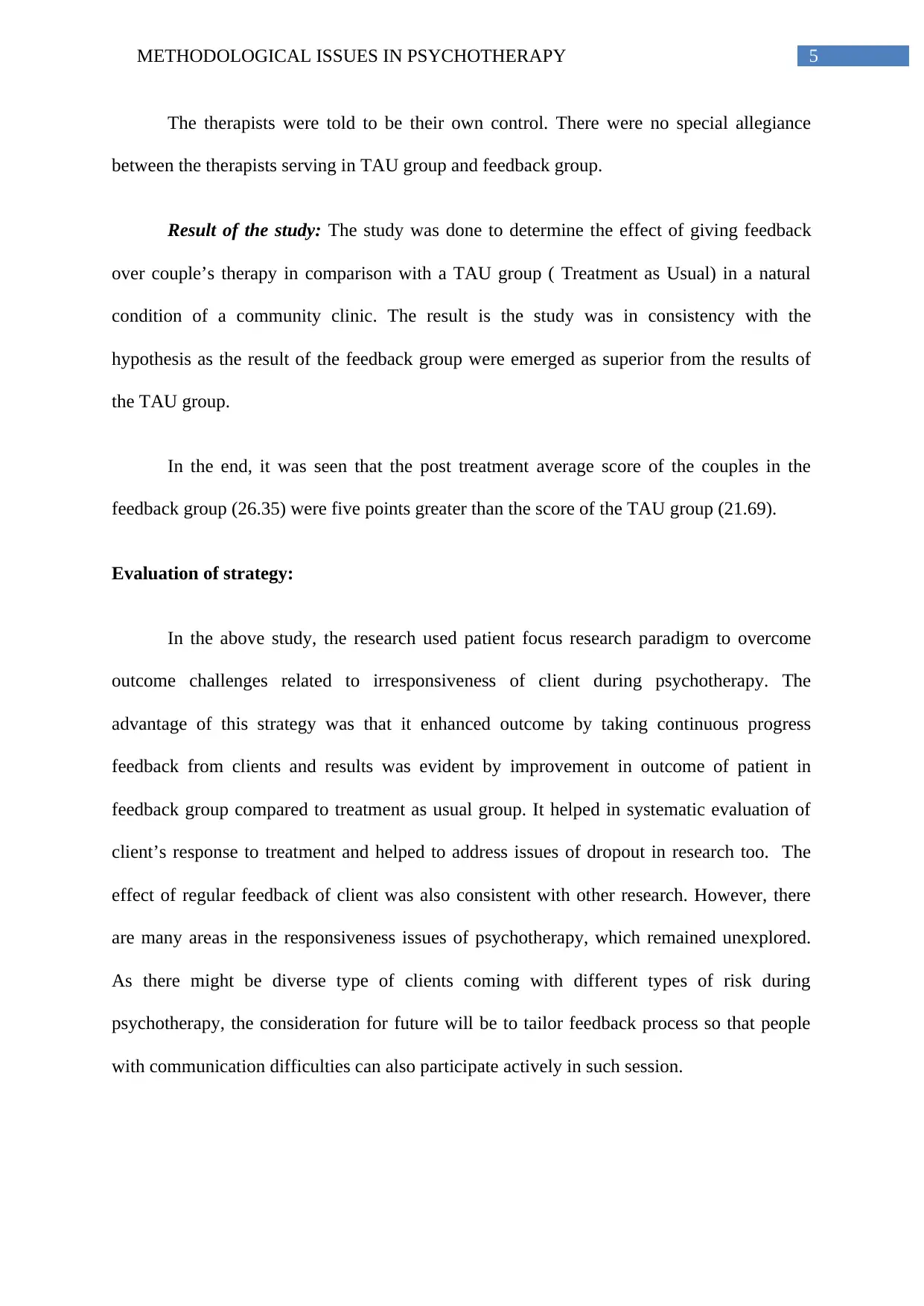
5METHODOLOGICAL ISSUES IN PSYCHOTHERAPY
The therapists were told to be their own control. There were no special allegiance
between the therapists serving in TAU group and feedback group.
Result of the study: The study was done to determine the effect of giving feedback
over couple’s therapy in comparison with a TAU group ( Treatment as Usual) in a natural
condition of a community clinic. The result is the study was in consistency with the
hypothesis as the result of the feedback group were emerged as superior from the results of
the TAU group.
In the end, it was seen that the post treatment average score of the couples in the
feedback group (26.35) were five points greater than the score of the TAU group (21.69).
Evaluation of strategy:
In the above study, the research used patient focus research paradigm to overcome
outcome challenges related to irresponsiveness of client during psychotherapy. The
advantage of this strategy was that it enhanced outcome by taking continuous progress
feedback from clients and results was evident by improvement in outcome of patient in
feedback group compared to treatment as usual group. It helped in systematic evaluation of
client’s response to treatment and helped to address issues of dropout in research too. The
effect of regular feedback of client was also consistent with other research. However, there
are many areas in the responsiveness issues of psychotherapy, which remained unexplored.
As there might be diverse type of clients coming with different types of risk during
psychotherapy, the consideration for future will be to tailor feedback process so that people
with communication difficulties can also participate actively in such session.
The therapists were told to be their own control. There were no special allegiance
between the therapists serving in TAU group and feedback group.
Result of the study: The study was done to determine the effect of giving feedback
over couple’s therapy in comparison with a TAU group ( Treatment as Usual) in a natural
condition of a community clinic. The result is the study was in consistency with the
hypothesis as the result of the feedback group were emerged as superior from the results of
the TAU group.
In the end, it was seen that the post treatment average score of the couples in the
feedback group (26.35) were five points greater than the score of the TAU group (21.69).
Evaluation of strategy:
In the above study, the research used patient focus research paradigm to overcome
outcome challenges related to irresponsiveness of client during psychotherapy. The
advantage of this strategy was that it enhanced outcome by taking continuous progress
feedback from clients and results was evident by improvement in outcome of patient in
feedback group compared to treatment as usual group. It helped in systematic evaluation of
client’s response to treatment and helped to address issues of dropout in research too. The
effect of regular feedback of client was also consistent with other research. However, there
are many areas in the responsiveness issues of psychotherapy, which remained unexplored.
As there might be diverse type of clients coming with different types of risk during
psychotherapy, the consideration for future will be to tailor feedback process so that people
with communication difficulties can also participate actively in such session.
⊘ This is a preview!⊘
Do you want full access?
Subscribe today to unlock all pages.

Trusted by 1+ million students worldwide
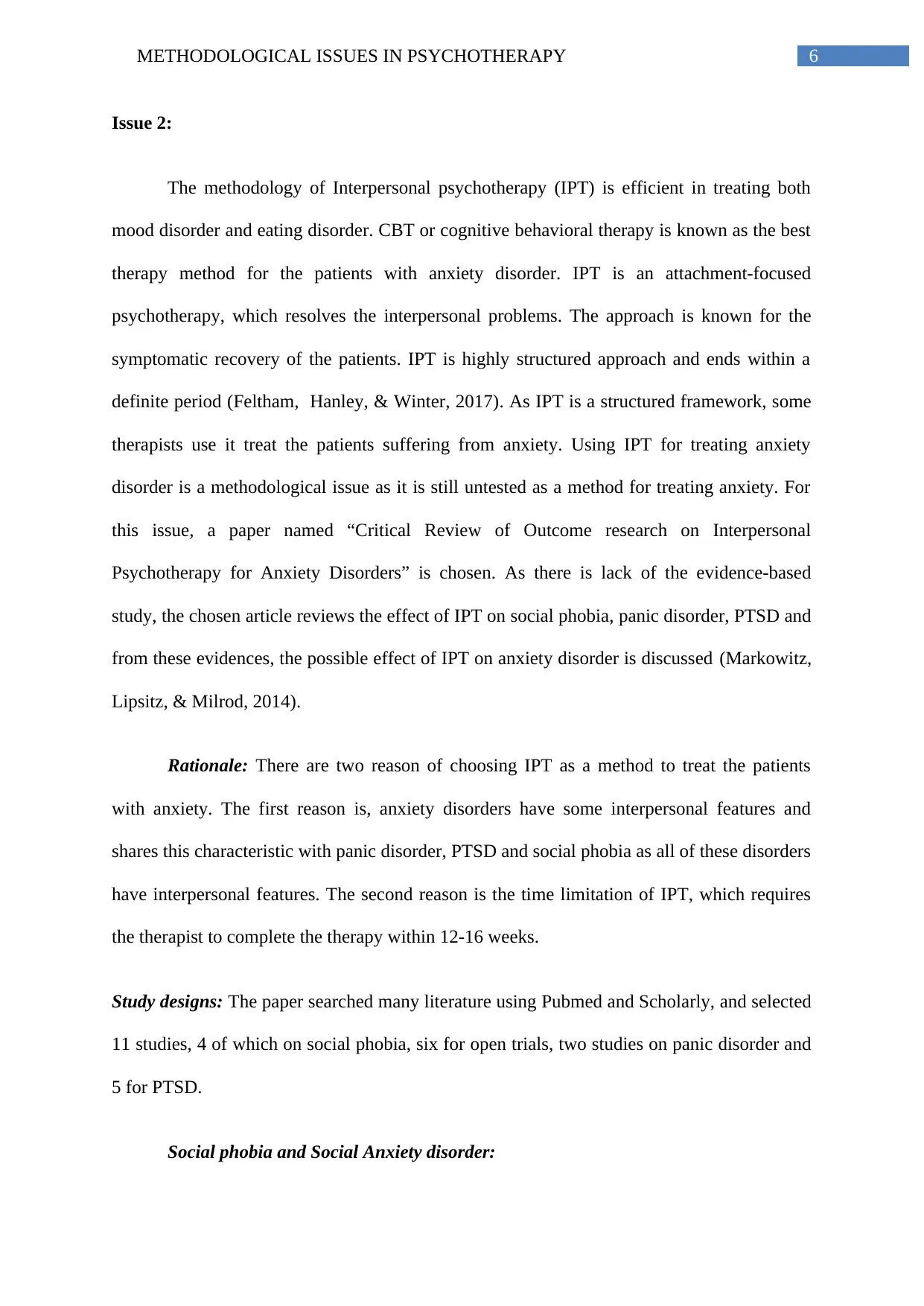
6METHODOLOGICAL ISSUES IN PSYCHOTHERAPY
Issue 2:
The methodology of Interpersonal psychotherapy (IPT) is efficient in treating both
mood disorder and eating disorder. CBT or cognitive behavioral therapy is known as the best
therapy method for the patients with anxiety disorder. IPT is an attachment-focused
psychotherapy, which resolves the interpersonal problems. The approach is known for the
symptomatic recovery of the patients. IPT is highly structured approach and ends within a
definite period (Feltham, Hanley, & Winter, 2017). As IPT is a structured framework, some
therapists use it treat the patients suffering from anxiety. Using IPT for treating anxiety
disorder is a methodological issue as it is still untested as a method for treating anxiety. For
this issue, a paper named “Critical Review of Outcome research on Interpersonal
Psychotherapy for Anxiety Disorders” is chosen. As there is lack of the evidence-based
study, the chosen article reviews the effect of IPT on social phobia, panic disorder, PTSD and
from these evidences, the possible effect of IPT on anxiety disorder is discussed (Markowitz,
Lipsitz, & Milrod, 2014).
Rationale: There are two reason of choosing IPT as a method to treat the patients
with anxiety. The first reason is, anxiety disorders have some interpersonal features and
shares this characteristic with panic disorder, PTSD and social phobia as all of these disorders
have interpersonal features. The second reason is the time limitation of IPT, which requires
the therapist to complete the therapy within 12-16 weeks.
Study designs: The paper searched many literature using Pubmed and Scholarly, and selected
11 studies, 4 of which on social phobia, six for open trials, two studies on panic disorder and
5 for PTSD.
Social phobia and Social Anxiety disorder:
Issue 2:
The methodology of Interpersonal psychotherapy (IPT) is efficient in treating both
mood disorder and eating disorder. CBT or cognitive behavioral therapy is known as the best
therapy method for the patients with anxiety disorder. IPT is an attachment-focused
psychotherapy, which resolves the interpersonal problems. The approach is known for the
symptomatic recovery of the patients. IPT is highly structured approach and ends within a
definite period (Feltham, Hanley, & Winter, 2017). As IPT is a structured framework, some
therapists use it treat the patients suffering from anxiety. Using IPT for treating anxiety
disorder is a methodological issue as it is still untested as a method for treating anxiety. For
this issue, a paper named “Critical Review of Outcome research on Interpersonal
Psychotherapy for Anxiety Disorders” is chosen. As there is lack of the evidence-based
study, the chosen article reviews the effect of IPT on social phobia, panic disorder, PTSD and
from these evidences, the possible effect of IPT on anxiety disorder is discussed (Markowitz,
Lipsitz, & Milrod, 2014).
Rationale: There are two reason of choosing IPT as a method to treat the patients
with anxiety. The first reason is, anxiety disorders have some interpersonal features and
shares this characteristic with panic disorder, PTSD and social phobia as all of these disorders
have interpersonal features. The second reason is the time limitation of IPT, which requires
the therapist to complete the therapy within 12-16 weeks.
Study designs: The paper searched many literature using Pubmed and Scholarly, and selected
11 studies, 4 of which on social phobia, six for open trials, two studies on panic disorder and
5 for PTSD.
Social phobia and Social Anxiety disorder:
Paraphrase This Document
Need a fresh take? Get an instant paraphrase of this document with our AI Paraphraser
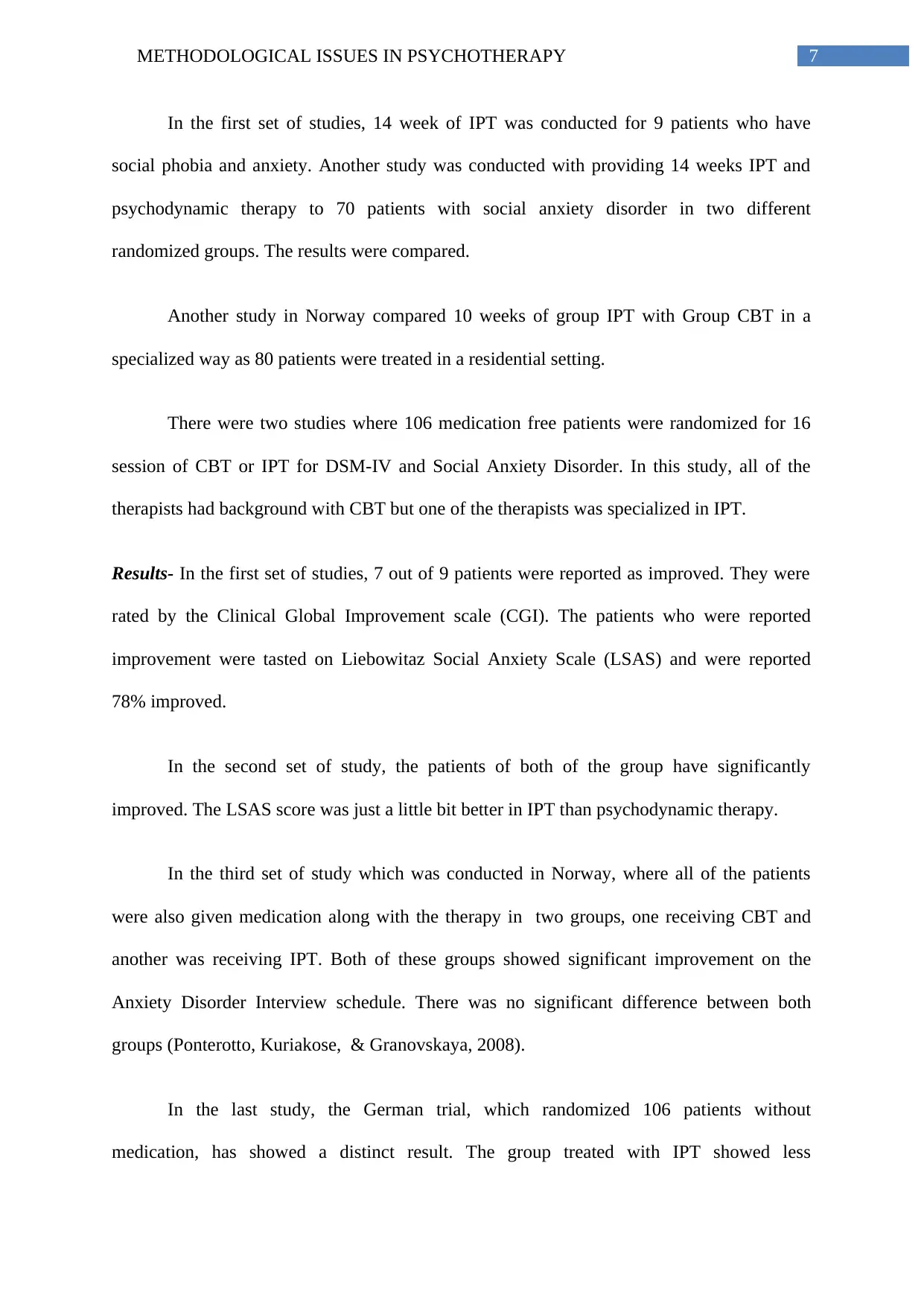
7METHODOLOGICAL ISSUES IN PSYCHOTHERAPY
In the first set of studies, 14 week of IPT was conducted for 9 patients who have
social phobia and anxiety. Another study was conducted with providing 14 weeks IPT and
psychodynamic therapy to 70 patients with social anxiety disorder in two different
randomized groups. The results were compared.
Another study in Norway compared 10 weeks of group IPT with Group CBT in a
specialized way as 80 patients were treated in a residential setting.
There were two studies where 106 medication free patients were randomized for 16
session of CBT or IPT for DSM-IV and Social Anxiety Disorder. In this study, all of the
therapists had background with CBT but one of the therapists was specialized in IPT.
Results- In the first set of studies, 7 out of 9 patients were reported as improved. They were
rated by the Clinical Global Improvement scale (CGI). The patients who were reported
improvement were tasted on Liebowitaz Social Anxiety Scale (LSAS) and were reported
78% improved.
In the second set of study, the patients of both of the group have significantly
improved. The LSAS score was just a little bit better in IPT than psychodynamic therapy.
In the third set of study which was conducted in Norway, where all of the patients
were also given medication along with the therapy in two groups, one receiving CBT and
another was receiving IPT. Both of these groups showed significant improvement on the
Anxiety Disorder Interview schedule. There was no significant difference between both
groups (Ponterotto, Kuriakose, & Granovskaya, 2008).
In the last study, the German trial, which randomized 106 patients without
medication, has showed a distinct result. The group treated with IPT showed less
In the first set of studies, 14 week of IPT was conducted for 9 patients who have
social phobia and anxiety. Another study was conducted with providing 14 weeks IPT and
psychodynamic therapy to 70 patients with social anxiety disorder in two different
randomized groups. The results were compared.
Another study in Norway compared 10 weeks of group IPT with Group CBT in a
specialized way as 80 patients were treated in a residential setting.
There were two studies where 106 medication free patients were randomized for 16
session of CBT or IPT for DSM-IV and Social Anxiety Disorder. In this study, all of the
therapists had background with CBT but one of the therapists was specialized in IPT.
Results- In the first set of studies, 7 out of 9 patients were reported as improved. They were
rated by the Clinical Global Improvement scale (CGI). The patients who were reported
improvement were tasted on Liebowitaz Social Anxiety Scale (LSAS) and were reported
78% improved.
In the second set of study, the patients of both of the group have significantly
improved. The LSAS score was just a little bit better in IPT than psychodynamic therapy.
In the third set of study which was conducted in Norway, where all of the patients
were also given medication along with the therapy in two groups, one receiving CBT and
another was receiving IPT. Both of these groups showed significant improvement on the
Anxiety Disorder Interview schedule. There was no significant difference between both
groups (Ponterotto, Kuriakose, & Granovskaya, 2008).
In the last study, the German trial, which randomized 106 patients without
medication, has showed a distinct result. The group treated with IPT showed less
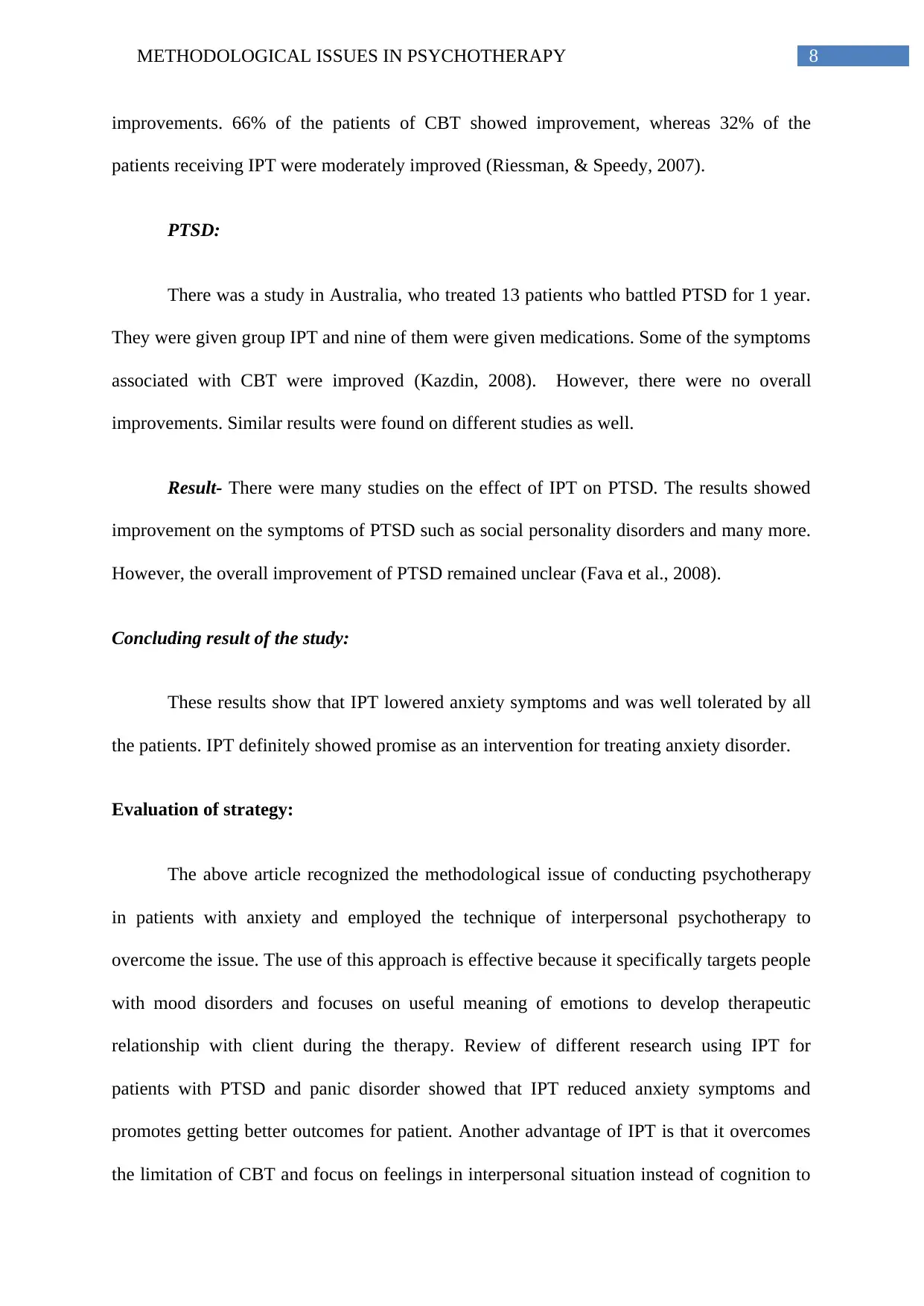
8METHODOLOGICAL ISSUES IN PSYCHOTHERAPY
improvements. 66% of the patients of CBT showed improvement, whereas 32% of the
patients receiving IPT were moderately improved (Riessman, & Speedy, 2007).
PTSD:
There was a study in Australia, who treated 13 patients who battled PTSD for 1 year.
They were given group IPT and nine of them were given medications. Some of the symptoms
associated with CBT were improved (Kazdin, 2008). However, there were no overall
improvements. Similar results were found on different studies as well.
Result- There were many studies on the effect of IPT on PTSD. The results showed
improvement on the symptoms of PTSD such as social personality disorders and many more.
However, the overall improvement of PTSD remained unclear (Fava et al., 2008).
Concluding result of the study:
These results show that IPT lowered anxiety symptoms and was well tolerated by all
the patients. IPT definitely showed promise as an intervention for treating anxiety disorder.
Evaluation of strategy:
The above article recognized the methodological issue of conducting psychotherapy
in patients with anxiety and employed the technique of interpersonal psychotherapy to
overcome the issue. The use of this approach is effective because it specifically targets people
with mood disorders and focuses on useful meaning of emotions to develop therapeutic
relationship with client during the therapy. Review of different research using IPT for
patients with PTSD and panic disorder showed that IPT reduced anxiety symptoms and
promotes getting better outcomes for patient. Another advantage of IPT is that it overcomes
the limitation of CBT and focus on feelings in interpersonal situation instead of cognition to
improvements. 66% of the patients of CBT showed improvement, whereas 32% of the
patients receiving IPT were moderately improved (Riessman, & Speedy, 2007).
PTSD:
There was a study in Australia, who treated 13 patients who battled PTSD for 1 year.
They were given group IPT and nine of them were given medications. Some of the symptoms
associated with CBT were improved (Kazdin, 2008). However, there were no overall
improvements. Similar results were found on different studies as well.
Result- There were many studies on the effect of IPT on PTSD. The results showed
improvement on the symptoms of PTSD such as social personality disorders and many more.
However, the overall improvement of PTSD remained unclear (Fava et al., 2008).
Concluding result of the study:
These results show that IPT lowered anxiety symptoms and was well tolerated by all
the patients. IPT definitely showed promise as an intervention for treating anxiety disorder.
Evaluation of strategy:
The above article recognized the methodological issue of conducting psychotherapy
in patients with anxiety and employed the technique of interpersonal psychotherapy to
overcome the issue. The use of this approach is effective because it specifically targets people
with mood disorders and focuses on useful meaning of emotions to develop therapeutic
relationship with client during the therapy. Review of different research using IPT for
patients with PTSD and panic disorder showed that IPT reduced anxiety symptoms and
promotes getting better outcomes for patient. Another advantage of IPT is that it overcomes
the limitation of CBT and focus on feelings in interpersonal situation instead of cognition to
⊘ This is a preview!⊘
Do you want full access?
Subscribe today to unlock all pages.

Trusted by 1+ million students worldwide
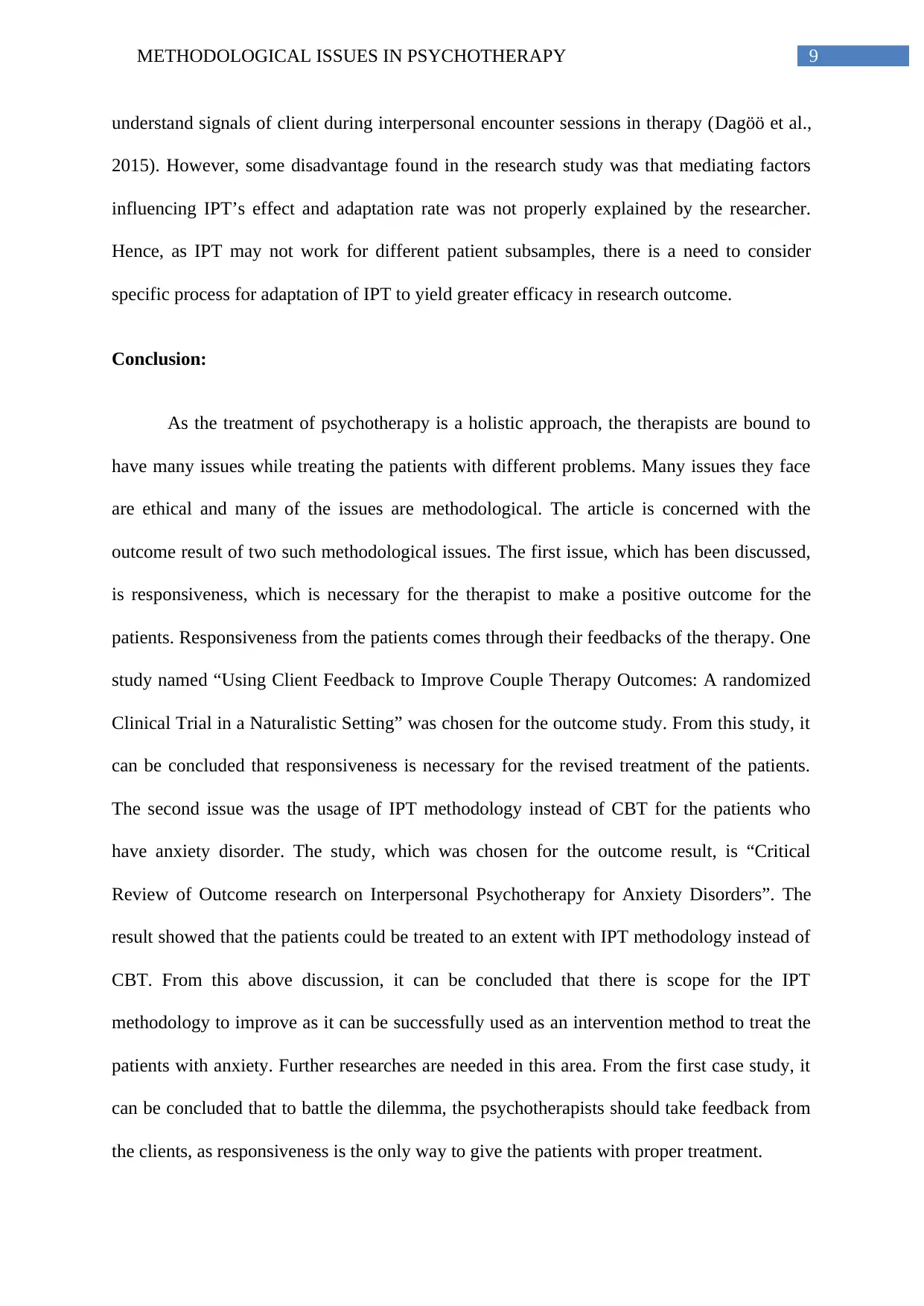
9METHODOLOGICAL ISSUES IN PSYCHOTHERAPY
understand signals of client during interpersonal encounter sessions in therapy (Dagöö et al.,
2015). However, some disadvantage found in the research study was that mediating factors
influencing IPT’s effect and adaptation rate was not properly explained by the researcher.
Hence, as IPT may not work for different patient subsamples, there is a need to consider
specific process for adaptation of IPT to yield greater efficacy in research outcome.
Conclusion:
As the treatment of psychotherapy is a holistic approach, the therapists are bound to
have many issues while treating the patients with different problems. Many issues they face
are ethical and many of the issues are methodological. The article is concerned with the
outcome result of two such methodological issues. The first issue, which has been discussed,
is responsiveness, which is necessary for the therapist to make a positive outcome for the
patients. Responsiveness from the patients comes through their feedbacks of the therapy. One
study named “Using Client Feedback to Improve Couple Therapy Outcomes: A randomized
Clinical Trial in a Naturalistic Setting” was chosen for the outcome study. From this study, it
can be concluded that responsiveness is necessary for the revised treatment of the patients.
The second issue was the usage of IPT methodology instead of CBT for the patients who
have anxiety disorder. The study, which was chosen for the outcome result, is “Critical
Review of Outcome research on Interpersonal Psychotherapy for Anxiety Disorders”. The
result showed that the patients could be treated to an extent with IPT methodology instead of
CBT. From this above discussion, it can be concluded that there is scope for the IPT
methodology to improve as it can be successfully used as an intervention method to treat the
patients with anxiety. Further researches are needed in this area. From the first case study, it
can be concluded that to battle the dilemma, the psychotherapists should take feedback from
the clients, as responsiveness is the only way to give the patients with proper treatment.
understand signals of client during interpersonal encounter sessions in therapy (Dagöö et al.,
2015). However, some disadvantage found in the research study was that mediating factors
influencing IPT’s effect and adaptation rate was not properly explained by the researcher.
Hence, as IPT may not work for different patient subsamples, there is a need to consider
specific process for adaptation of IPT to yield greater efficacy in research outcome.
Conclusion:
As the treatment of psychotherapy is a holistic approach, the therapists are bound to
have many issues while treating the patients with different problems. Many issues they face
are ethical and many of the issues are methodological. The article is concerned with the
outcome result of two such methodological issues. The first issue, which has been discussed,
is responsiveness, which is necessary for the therapist to make a positive outcome for the
patients. Responsiveness from the patients comes through their feedbacks of the therapy. One
study named “Using Client Feedback to Improve Couple Therapy Outcomes: A randomized
Clinical Trial in a Naturalistic Setting” was chosen for the outcome study. From this study, it
can be concluded that responsiveness is necessary for the revised treatment of the patients.
The second issue was the usage of IPT methodology instead of CBT for the patients who
have anxiety disorder. The study, which was chosen for the outcome result, is “Critical
Review of Outcome research on Interpersonal Psychotherapy for Anxiety Disorders”. The
result showed that the patients could be treated to an extent with IPT methodology instead of
CBT. From this above discussion, it can be concluded that there is scope for the IPT
methodology to improve as it can be successfully used as an intervention method to treat the
patients with anxiety. Further researches are needed in this area. From the first case study, it
can be concluded that to battle the dilemma, the psychotherapists should take feedback from
the clients, as responsiveness is the only way to give the patients with proper treatment.
Paraphrase This Document
Need a fresh take? Get an instant paraphrase of this document with our AI Paraphraser

10METHODOLOGICAL ISSUES IN PSYCHOTHERAPY
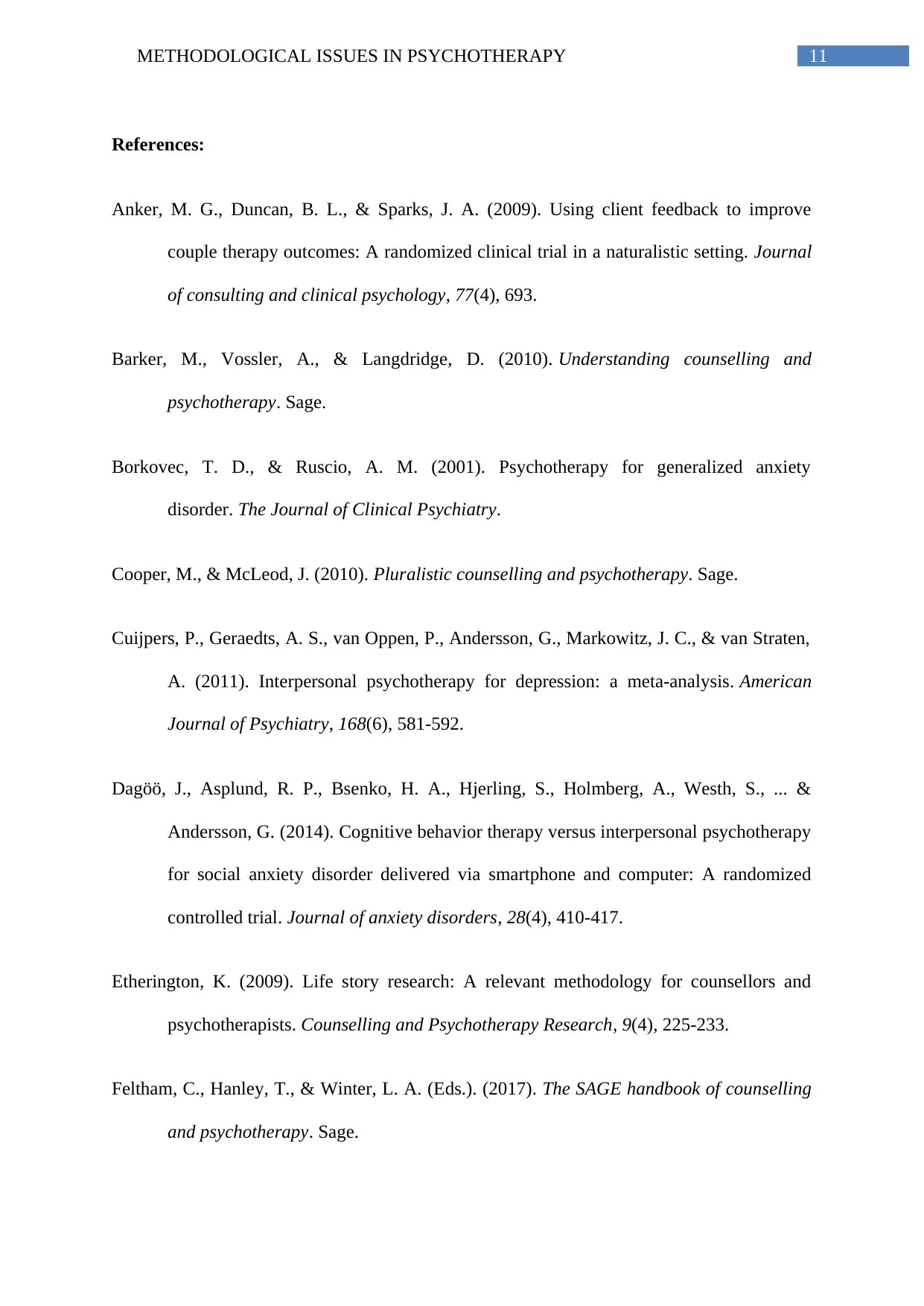
11METHODOLOGICAL ISSUES IN PSYCHOTHERAPY
References:
Anker, M. G., Duncan, B. L., & Sparks, J. A. (2009). Using client feedback to improve
couple therapy outcomes: A randomized clinical trial in a naturalistic setting. Journal
of consulting and clinical psychology, 77(4), 693.
Barker, M., Vossler, A., & Langdridge, D. (2010). Understanding counselling and
psychotherapy. Sage.
Borkovec, T. D., & Ruscio, A. M. (2001). Psychotherapy for generalized anxiety
disorder. The Journal of Clinical Psychiatry.
Cooper, M., & McLeod, J. (2010). Pluralistic counselling and psychotherapy. Sage.
Cuijpers, P., Geraedts, A. S., van Oppen, P., Andersson, G., Markowitz, J. C., & van Straten,
A. (2011). Interpersonal psychotherapy for depression: a meta-analysis. American
Journal of Psychiatry, 168(6), 581-592.
Dagöö, J., Asplund, R. P., Bsenko, H. A., Hjerling, S., Holmberg, A., Westh, S., ... &
Andersson, G. (2014). Cognitive behavior therapy versus interpersonal psychotherapy
for social anxiety disorder delivered via smartphone and computer: A randomized
controlled trial. Journal of anxiety disorders, 28(4), 410-417.
Etherington, K. (2009). Life story research: A relevant methodology for counsellors and
psychotherapists. Counselling and Psychotherapy Research, 9(4), 225-233.
Feltham, C., Hanley, T., & Winter, L. A. (Eds.). (2017). The SAGE handbook of counselling
and psychotherapy. Sage.
References:
Anker, M. G., Duncan, B. L., & Sparks, J. A. (2009). Using client feedback to improve
couple therapy outcomes: A randomized clinical trial in a naturalistic setting. Journal
of consulting and clinical psychology, 77(4), 693.
Barker, M., Vossler, A., & Langdridge, D. (2010). Understanding counselling and
psychotherapy. Sage.
Borkovec, T. D., & Ruscio, A. M. (2001). Psychotherapy for generalized anxiety
disorder. The Journal of Clinical Psychiatry.
Cooper, M., & McLeod, J. (2010). Pluralistic counselling and psychotherapy. Sage.
Cuijpers, P., Geraedts, A. S., van Oppen, P., Andersson, G., Markowitz, J. C., & van Straten,
A. (2011). Interpersonal psychotherapy for depression: a meta-analysis. American
Journal of Psychiatry, 168(6), 581-592.
Dagöö, J., Asplund, R. P., Bsenko, H. A., Hjerling, S., Holmberg, A., Westh, S., ... &
Andersson, G. (2014). Cognitive behavior therapy versus interpersonal psychotherapy
for social anxiety disorder delivered via smartphone and computer: A randomized
controlled trial. Journal of anxiety disorders, 28(4), 410-417.
Etherington, K. (2009). Life story research: A relevant methodology for counsellors and
psychotherapists. Counselling and Psychotherapy Research, 9(4), 225-233.
Feltham, C., Hanley, T., & Winter, L. A. (Eds.). (2017). The SAGE handbook of counselling
and psychotherapy. Sage.
⊘ This is a preview!⊘
Do you want full access?
Subscribe today to unlock all pages.

Trusted by 1+ million students worldwide
1 out of 14
Related Documents
Your All-in-One AI-Powered Toolkit for Academic Success.
+13062052269
info@desklib.com
Available 24*7 on WhatsApp / Email
![[object Object]](/_next/static/media/star-bottom.7253800d.svg)
Unlock your academic potential
Copyright © 2020–2026 A2Z Services. All Rights Reserved. Developed and managed by ZUCOL.





